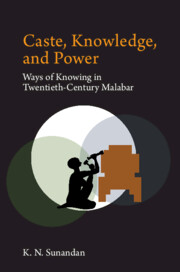Book contents
- Frontmatter
- Contents
- Acknowledgements
- Notes on Transliteration
- Introduction: Caste, Knowledge, and Power
- 1 An Ashari World of Knowing
- 2 An Ashari World of Ignoring
- 3 A Nampoothiri World of Acharam
- 4 Nampoothiris and the Order of Knowledge
- 5 Asharis and the Order of Knowledge
- Postscript: Towards an Artisanal Way of Practice of Knowing
- Bibliography
- Index
3 - A Nampoothiri World of Acharam
Published online by Cambridge University Press: 11 October 2022
- Frontmatter
- Contents
- Acknowledgements
- Notes on Transliteration
- Introduction: Caste, Knowledge, and Power
- 1 An Ashari World of Knowing
- 2 An Ashari World of Ignoring
- 3 A Nampoothiri World of Acharam
- 4 Nampoothiris and the Order of Knowledge
- 5 Asharis and the Order of Knowledge
- Postscript: Towards an Artisanal Way of Practice of Knowing
- Bibliography
- Index
Summary
The claims of superiority by nations, races, and castes always accompany a constructed past where these claims find justifications. It is common sense in academic scholarship that often these histories as constructed pasts change according to the needs of the present, and new histories are constructed to match these requirements. In India, the claim that Brahmins were the authority of traditional knowledge and it is this authority that resulted in their dominance is such a claim. It is accompanied by descriptions of the Vedas and other Sanskrit texts explained not only as the source of traditional knowledge but also as texts that contained all important modern scientific knowledge. This chapter positions the changing claims of dominance by Brahmins in the historical context by explaining the social processes that necessitated the changes in the claims of domination.
Anthropologists and historians have explained brahmanical domination in India in relation to their economic, political, and ritualistic power. The European scholars of the colonial period generally explained the brahmanical domination citing the ‘spiritual nature’ of Hindu society and the importance of Brahmins in the ritual practices based on Vedic knowledge. Ambedkar, while criticizing the caste system, challenged the authority of brahmanical knowledge and considered the Sanskritic textual tradition, which he called shasthras, as the fundamental resource for caste practice. In the beginning of the second half of the twentieth century, M. N. Srinivas and Louis Dumont raised serious questions regarding power and status in relation to the dominance of a caste in a locality. Srinivas in his early work on dominant caste explained that ‘a caste may be said to be “dominant” when it preponderates numerically over the other castes and when it is also wields preponderant economic and political power’. In a later work, Srinivas observed that ‘important as the secular criteria are, ritual superiority has an independent existence and power of its own’. He added that on secular criteria alone, a Brahmin may occupy a very low position, but he is still a Brahmin and as such entitled to respect in the context of ritual and pollution. In this work, I am using the category ‘dominant caste’ not entirely in the sense that Srinivas uses it; it is mainly to indicate the dominating power of the castes, which are usually mentioned as ‘upper castes’.
- Type
- Chapter
- Information
- Caste, Knowledge, and PowerWays of Knowing in Twentieth Century Malabar, pp. 95 - 125Publisher: Cambridge University PressPrint publication year: 2023



